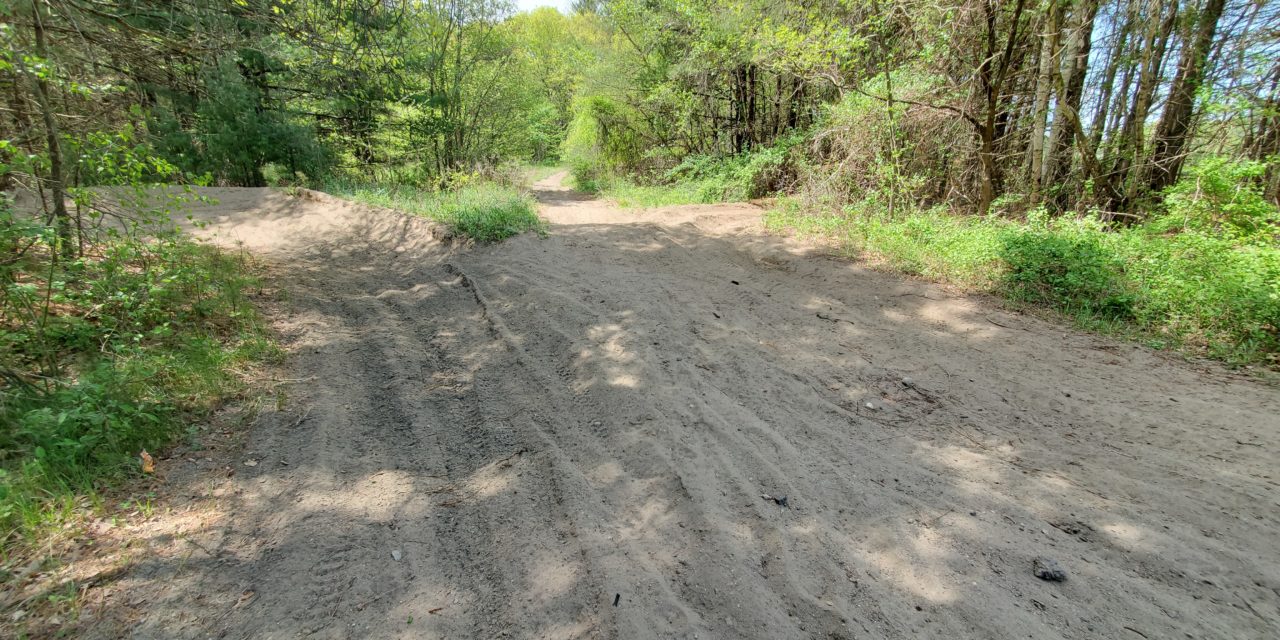ALL-TERRAIN VEHICLES (ATVs) caused this damage to Willis Woods on upper Main Street recently. ATVs are prohibited from being used in conservation areas and public lands. (Courtesy Photo)
By DAN TOMASELLO
LYNNFIELD — All-terrain vehicles (ATVs) are prohibited from being used in conservation areas and on public lands, Planning and Conservation Director Emilie Cademartori stated in a blog post on the town’s website.
Cademartori recalled that ATVs have grown in popularity over the last several decades, especially since the COVID-19 pandemic began in March 2020.
“With this increased usage, the Conservation Commission wants Lynnfield residents to be aware of the negative environmental impacts from ATVs as well as rider safety requirements,” said Cademartori.
Cademartori noted that people have been riding ATVs on a variety of upper Main Street properties owned by Bostik, the Conservation Commission and the Lynnfield Center Water District as well as the Willis Woods conservation area. She said people have been using ATVs at the Broad Meadows conservation area that is located near the Peabody line as well as conservation areas located off Locksley and Stafford Roads.
“ATV use is not permitted on any public lands in Lynnfield, and is limited to private property only,” said Cademartori.
“All ATV vehicles must be registered by the state, with proof of registration held in the operator’s possession.”
Cademartori said using ATVs on public lands has resulted in environmental damage to vegetation and water quality. She also said ATVs have increased runoff and soil erosion.
“The heavy weight of ATVs compact soils, which then create areas for runoff and erosion,” said Cademartori. “Surface soils are washed downhill into water, where sediments have negative impacts on aquatic habitats for fish, amphibians and other wildlife. Soil compaction also limits root growth for plants, including those that wildlife feed upon.”
Cademartori said using ATVs on public lands has frequently left trails, plants and young saplings damaged, which she said reduces “coverage for the forest floor.”
“As soil is eroded, roots are often exposed and damaged, thereby harming nearby trees,” said Cademartori. “ATVs can also spread invasive species deep into forests when plant fragments and seeds are carried by the vehicles over long distances. Invasive species disrupt local ecosystems and food sources for wildlife.”
Cademartori recalled that the Massachusetts Environmental Police oversees ATV rider safety rules and regulations as outlined in the Massachusetts Recreation Vehicle Laws. She noted that former Gov. Deval Patrick signed the legislation into law in 2010.
“The law includes education requirements for young riders, age restrictions for operators and increased penalties for illegal use,” said Cademartori. “Many residents are unaware of these regulations. No person between the ages 14 and 16 can operate an ATV with an engine capacity more than 90 cubic centimeters. With a capacity less than 90 cubic centimeters, the operator must be directly supervised by a person of at least 18 years of age.”
Cademartori noted that state law prohibits children between the ages of 10 and 14 to operate an ATV unless they are “directly supervised in preparation for, or while a participant in, a supervised and sanctioned race, rally or organized event approved by a municipal permitting authority.” She said the ATV must be limited to 90 cubic centimeters or less.
“Additionally, completion of an ATV safety course is required for anyone under age 18,” said Cademartori. “All ATV riders must wear an approved helmet.”
If residents want to ride an ATV at a public state park or forest, Cademartori said they can visit https://www.mass.gov/service-details/find-a-state-park-ohv-riding-trail to view a list of places where people can ride. The closest areas where people can ride an ATV are in Fall River, Foxborough, Franklin, Freetown and Wrentham. She also said residents can call the Department of Conservation and Recreation (DCR) at (617)-626-1250 for more information.
“ATV use is only permitted on designated trails,” said Cademartori.





